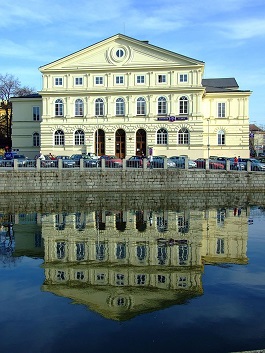
The plan to repair the Budějovice KD Slavie is oversized
 |
The contract is set at 410 million CZK. The councilors believe that companies will exceed this amount. If the price is too high, the city will be able to decide not to repair Slavie this way, said South Bohemian Governor and Budějovice councilor Martin Kuba (ODS). The previous city administration selected the architectural design according to which the building should be repaired.
"That project is oversized for the needs of what that cultural house should fulfill. It is architecturally a very nice thing, but for the residents of České Budějovice, there are extremely expensive technologies, like underfloor heating in the hall. Given the operation we can expect there, it's a bit of unnecessary expense. Since a tender has been announced, we cannot interfere with it, because the law now requires us to complete it. Afterwards, we can decide. We need to find out if we will receive any offers, evaluate them accordingly, and then decide," said Kuba.
According to Deputy Mayor Petra Maroše (ODS), the economics of operation are unclear; there is a risk of necessary operational subsidies in the tens of millions. According to the architectural design, it will be complicated to repair the building, as it contains many elements with excessively high acquisition costs, councilors said. They believe their predecessors did not strive for Slavie to be repaired as cheaply as possible; they see more an effort for someone's personal architectural monument. České Budějovice opened a bank loan of 800 million CZK due to the reconstruction of Slavie and other investments.
Moravec pointed out that the former councilors consulted the architectural competition with opposition clubs. "It was managed by Juraj Thoma (former Deputy Mayor from HOPB, currently on sick leave), I have it all relayed and I believe it was truly so. The cultural house Slavie deserves renewal. Whether everything there is unnecessarily expensive, I don't know how to respond to that. I am not familiar with the documentation in detail. I have also heard that the tender is problematic because no one is applying," said Moravec.
He added that due to inquiries from construction firms, the deadline for submitting bids has to be extended. The city must hand over the construction site to the tender winner in May, and there are two years for repairs. The councilors expect to also obtain a subsidy.
České Budějovice wanted to reconstruct Slavie according to a joint proposal from French architects from the office of Chaix & Morel et Associés, the Austrian studio Christian Anton Pichler, and Austrian architect Jan Proksa. The extension should include a main hall, rotated 90 degrees compared to the current location and larger. Below, there will be a small hall with a café. The original main hall is considered acoustically unsuitable by the architects. The new multifunctional hall will accommodate 550 standing spectators and up to 60 performers, including the philharmonic orchestra. The building should be extended by 6.5 meters, with new foyers and staircases created. The design work reportedly cost over 36 million CZK.
Slavie was originally a German Community House, built between 1871 and 1872. It was designed as the cultural, social, and political center for the Czech Budějovice Germans. In the period before and during World War II, it became a center of German Hitlerite nationalism. After liberation, it was named Stalin's House and later housed the regional secretariat of the Communist Party of Czechoslovakia, before it was transferred to the city and subsequently served the army. In 1962, the state handed it back to the city, and for a time, the place became one of the cultural centers of České Budějovice.
The English translation is powered by AI tool. Switch to Czech to view the original text source.
0 comments
add comment
Related articles
0
31.05.2023 | Č. Budějovice has started the reconstruction of the Slavie cultural center for 500 million CZK
0
26.04.2022 | The reconstruction of Česke Budějovice's Slavia will be more expensive by about 100 million CZK
1
19.04.2021 | Reconstruction of the cultural house in Č. Budějovice - results of the dialogue
4
13.07.2020 | České Budějovice will remodel KD Slavie according to the project by Chaix & Morel et Associés
0
27.09.2011 | In České Budějovice, a discussion began about the future of the KD Slavie











